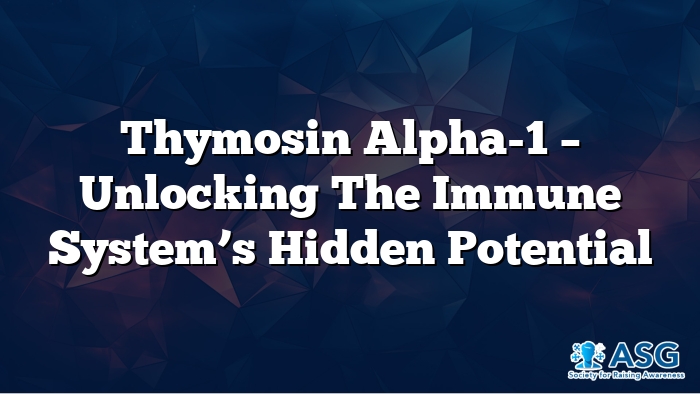Thymosin Alpha-1 – Unlocking the Immune System’s Hidden Potential

Thymosin Alpha-1 is a remarkable peptide that has gained significant attention in the medical community due to its potential to modulate the immune system and offer therapeutic benefits. This comprehensive guide delves into the intricacies of Thymosin Alpha-1, exploring its mechanism of action, benefits, and clinical applications. We'll also examine its role in cancer therapy, immune system modulation, and viral infections, as well as discuss its side effects, dosage, and how it compares to other immunotherapies.
What is Thymosin Alpha-1?
Thymosin Alpha-1 is a naturally occurring peptide derived from the thymus gland, a crucial organ in the immune system. This bioactive peptide has been the subject of extensive research due to its ability to enhance immune function and potentially treat various conditions.
The thymus gland, located in the chest, plays a vital role in the development of the immune system, particularly in early life. As we age, the thymus naturally shrinks, which can lead to a decline in immune function. Thymosin Alpha-1 is one of several peptides produced by the thymus that help regulate immune responses.
Mechanism of Action
Thymosin Alpha-1 works by enhancing various aspects of the immune system. Its primary mechanism of action involves:
1. Stimulating the production and maturation of T-cells, which are crucial for adaptive immunity
2. Enhancing the activity of natural killer cells, important for innate immunity
3. Modulating the production of cytokines, which are signaling molecules in the immune system
4. Promoting the differentiation of immune cells
These actions collectively contribute to a more robust and balanced immune response, making the body better equipped to fight off infections and abnormal cell growth.
Benefits of Thymosin Alpha-1
The potential benefits of Thymosin Alpha-1 are wide-ranging, thanks to its immune-modulating properties. Some of the key benefits include:
– Enhanced immune function
– Improved response to infections, both viral and bacterial
– Potential anti-cancer effects
– Reduced inflammation
– Improved vaccine responses
– Potential benefits in autoimmune conditions
These benefits make Thymosin Alpha-1 a subject of interest for peptide clinics and researchers exploring new therapeutic approaches for various conditions.
Clinical Applications
Thymosin Alpha-1 has found applications in various clinical settings. Its use is being explored in:

– Treatment of chronic viral infections, such as hepatitis B and C
– Cancer therapy, particularly in combination with other treatments
– Management of immunodeficiency disorders
– Enhancing vaccine efficacy, especially in immunocompromised individuals
– Treatment of chronic fatigue syndrome
– Management of certain autoimmune conditions
As research progresses, the list of potential clinical applications continues to grow, making Thymosin Alpha-1 a versatile tool in modern medicine.
Thymosin Alpha-1 in Cancer Therapy
One of the most promising areas of research for Thymosin Alpha-1 is in cancer therapy. Its ability to enhance the immune system's ability to recognize and attack cancer cells makes it a valuable adjunct to traditional cancer treatments.
Thymosin Alpha-1 can:
– Enhance the body's natural anti-tumor responses
– Improve the efficacy of chemotherapy and radiation therapy
– Potentially reduce the side effects of traditional cancer treatments
– Help prevent cancer recurrence by maintaining immune vigilance
Many peptide manufacturers are focusing on producing high-quality Thymosin Alpha-1 for cancer research and treatment protocols.
Immune System Modulation
The immune-modulating effects of Thymosin Alpha-1 are at the core of its therapeutic potential. By enhancing the production and activity of various immune cells, it helps create a more balanced and effective immune response.
This modulation can be particularly beneficial in:
– Chronic infections where the immune system may be suppressed
– Autoimmune conditions where the immune system is overactive
– Aging individuals experiencing natural decline in immune function
– Situations where the immune system needs a boost, such as during cancer treatment
Thymosin Alpha-1 for Viral Infections
In the realm of viral infections, Thymosin Alpha-1 has shown considerable promise. Its ability to enhance the body's natural antiviral responses makes it a valuable tool in combating both acute and chronic viral infections.
Research has shown potential benefits in treating:
– Hepatitis B and C
– HIV/AIDS
– Influenza
– Herpes simplex virus
The ongoing COVID-19 pandemic has also sparked interest in Thymosin Alpha-1 as a potential therapeutic agent, with several studies exploring its efficacy in managing severe cases of the disease.
Side Effects and Safety
One of the notable advantages of Thymosin Alpha-1 is its favorable safety profile. Unlike many immunomodulatory drugs, Thymosin Alpha-1 tends to have minimal side effects, making it an attractive option for long-term use.
Common side effects may include:
– Mild injection site reactions
– Temporary fatigue
– Mild flu-like symptoms
However, as with any medical treatment, it's crucial to consult with a healthcare provider before starting Thymosin Alpha-1 therapy. Peptide safety should always be a top priority, and patients should be monitored for any adverse reactions.
Dosage and Administration
The dosage and administration of Thymosin Alpha-1 can vary depending on the condition being treated and the individual patient's needs. Typically, it is administered via subcutaneous injection, which can be done at home after proper training.
Standard dosages often range from 1.6 mg to 6.4 mg, administered two to three times per week. However, dosages may be adjusted based on the specific condition and patient response.
Proper peptide reconstitution and administration techniques are crucial for ensuring the efficacy and safety of Thymosin Alpha-1 treatment. Many peptide clinics offer training and support for patients undergoing Thymosin Alpha-1 therapy.
Comparing Thymosin Alpha-1 with Other Immunotherapies
Thymosin Alpha-1 stands out among immunotherapies due to its unique properties and favorable safety profile. Unlike some more aggressive immunotherapies, Thymosin Alpha-1 works by enhancing the body's natural immune responses rather than directly attacking pathogens or abnormal cells.
This approach can lead to:
– Fewer side effects compared to more aggressive treatments
– The potential for long-term use without significant risks
– Compatibility with other treatments, allowing for combination therapies
However, it's important to note that Thymosin Alpha-1 may not be as potent as some other immunotherapies for certain conditions, and its efficacy can vary depending on the specific application.
Research and Studies
Extensive research has been conducted on Thymosin Alpha-1, with numerous studies demonstrating its potential in various therapeutic areas. Some key findings include:
– Improved outcomes in hepatitis B and C treatment when combined with standard therapies
– Enhanced immune responses in cancer patients undergoing chemotherapy
– Potential benefits in managing autoimmune conditions such as rheumatoid arthritis
– Improved vaccine responses in elderly and immunocompromised individuals
Ongoing research continues to explore new applications and refine our understanding of Thymosin Alpha-1's mechanisms of action. Many peptide suppliers are actively supporting this research by providing high-quality Thymosin Alpha-1 for study purposes.
Thymosin Alpha-1 in Autoimmune Diseases
The role of Thymosin Alpha-1 in autoimmune diseases is an area of growing interest. Its ability to modulate the immune system, rather than simply suppressing it, makes it a promising candidate for managing these complex conditions.
Research has shown potential benefits in:
– Rheumatoid arthritis
– Systemic lupus erythematosus
– Multiple sclerosis
– Crohn's disease
By helping to balance the immune response, Thymosin Alpha-1 may offer a new approach to managing autoimmune conditions without the severe side effects often associated with traditional immunosuppressive therapies.
Patient Experiences and Testimonials
Many patients who have undergone Thymosin Alpha-1 therapy report positive experiences. Common feedback includes:
– Improved energy levels and reduced fatigue
– Enhanced overall well-being
– Better management of chronic conditions
– Reduced frequency and severity of infections
While individual experiences can vary, these testimonials highlight the potential quality-of-life improvements that Thymosin Alpha-1 therapy can offer. However, it's important to approach such anecdotal evidence with caution and always consult with healthcare professionals.
Future Prospects and Developments
The future of Thymosin Alpha-1 looks promising, with ongoing research exploring new applications and refining existing protocols. Some areas of future development include:
– Personalized dosing regimens based on individual immune profiles
– Combination therapies with other immunomodulatory agents
– Novel delivery methods to improve absorption and efficacy
– Expanded applications in age-related immune decline
As research progresses, we can expect to see more refined and targeted uses of Thymosin Alpha-1 in various medical fields. This continued development is likely to drive innovation in peptide synthesis and peptide quality control processes.
Regulatory Status and Approval
The regulatory status of Thymosin Alpha-1 varies by country. In some regions, it has received approval for specific indications, such as chronic hepatitis B treatment. In others, it remains an investigational drug.
In the United States, Thymosin Alpha-1 is not currently FDA-approved but is available for research purposes. Many peptide wholesalers and online peptide stores offer Thymosin Alpha-1 for research use only.
It's crucial for patients and researchers to be aware of the legal status of Thymosin Alpha-1 in their region and to obtain it only through reputable sources. Peptide authentication and peptide purity tests are essential to ensure the quality and safety of Thymosin Alpha-1 products.
Conclusion
Thymosin Alpha-1 represents a promising frontier in immunotherapy, offering a unique approach to enhancing immune function and treating various conditions. Its favorable safety profile, combined with its potential efficacy in a wide range of applications, makes it an exciting area of research and clinical exploration.
As we continue to unravel the complexities of the immune system, Thymosin Alpha-1 stands out as a versatile tool that may help address some of the most challenging medical conditions of our time. From cancer therapy to autoimmune disease management, the potential applications of this remarkable peptide are vast and varied.
However, it's important to remember that while the prospects are exciting, more research is needed to fully understand the long-term effects and optimal uses of Thymosin Alpha-1. Patients and healthcare providers should approach this therapy with cautious optimism, always prioritizing safety and evidence-based practices.
What conditions can Thymosin Alpha-1 potentially treat?
Thymosin Alpha-1 shows promise in treating chronic viral infections, enhancing cancer therapies, managing autoimmune conditions, and boosting overall immune function.
Is Thymosin Alpha-1 safe for long-term use?
Generally, Thymosin Alpha-1 has a favorable safety profile and is well-tolerated for long-term use. However, individual responses may vary, and medical supervision is recommended.
How is Thymosin Alpha-1 administered?
Thymosin Alpha-1 is typically administered via subcutaneous injection. Dosage and frequency depend on the specific condition being treated and should be determined by a healthcare professional.
| Aspect | Thymosin Alpha-1 |
|---|---|
| Origin | Derived from thymus gland |
| Primary Function | Immune system modulation |
| Administration | Subcutaneous injection |
| Safety Profile | Generally well-tolerated |
| Key Applications | Viral infections, cancer therapy, autoimmune diseases |
